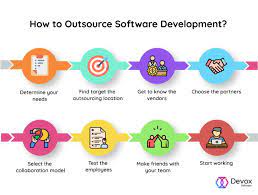Software outsourcing has become a popular way for businesses to access skilled software developers without having to hire them directly. Outsourcing companies provide businesses with access to highly experienced and qualified software engineers, which can help them develop and maintain their software projects more quickly and efficiently than if they did it in-house.
Software outsourcing companies are able to provide businesses with a wide range of services, from custom software development, to system integration and application maintenance. By outsourcing these services, businesses can benefit from the expertise of experienced professionals who understand the latest technology trends and how to use them effectively.
Outsourcing companies provide access to a variety of different software development tools and frameworks, making it easier for businesses to create custom applications that meet their specific needs. They also handle the entire development process, from concept to deployment, ensuring that all requirements are met on time and within budget. This makes it much easier for businesses to focus on their core competencies while still getting the most out of their software projects.
In addition, outsourcing companies often offer additional services such as project management, quality assurance testing, and technical support. This helps ensure that all aspects of the project are managed properly so that any issues can be addressed quickly and efficiently. Furthermore, many outsourcing companies also offer consulting services which help businesses identify areas where they need improvement in terms of their software development process or technology stack.
Finally, working with an outsourcing company can help reduce costs significantly compared to hiring in-house developers. By leveraging the expertise of experienced professionals from outside the organization, businesses can save money on salaries as well as other overhead costs associated with running an in-house team. This makes it easier for them to focus on their core business activities while still getting the most out of their software projects.
Overall, working with an experienced software outsourcing company is a great way for businesses to access skilled professionals who understand how best to utilize technology trends for maximum efficiency and cost savings. By taking advantage of these services, organizations can save time and money while ensuring that all aspects of their software projects are managed properly so they get the most out of their investments.
Eight Benefits of Software Outsourcing Companies:
- Cost Savings
- Access to Expertise
- Flexibility
- Increased Efficiency
- Focus on Core Business Activities
- Reduced Risk
- Improved Quality Control
- Access To Global Talent Pool
The seven drawbacks of using software outsourcing companies.
- Language barrier
- Security concerns
- Quality control
- Lack of control
- Cost increases
- Cultural differences
- Time zone challenges
Cost Savings
Software outsourcing companies offer a great opportunity for businesses to reduce their overhead costs and save money. Outsourcing software development can be a cost-effective way for businesses to access the expertise and resources they need without needing to hire full-time staff. This can help businesses save on labor costs, as well as other expenses associated with in-house software development such as training and equipment.
In addition to saving on labor costs, outsourcing also allows businesses to access the most up-to-date technology and expertise. Software developers working in an outsourcing company are typically highly experienced and knowledgeable in the latest technologies and techniques, allowing them to develop software faster than if the work was done in-house. This can help businesses save time and money, as well as ensure that the software they receive is of a high quality.
Overall, outsourcing software development is an excellent way for businesses to reduce their overhead costs while still accessing the expertise they need for successful software development projects. By taking advantage of this cost savings opportunity, businesses can enjoy greater success without having to worry about expensive labor or other expenses associated with in-house development.
Access to Expertise
Software outsourcing has become an increasingly popular option for businesses looking to access specialized expertise and save costs. One of the key benefits of outsourcing is the ability to access a wide range of experienced professionals who can provide specialized expertise that may not be available internally.
Outsourcing companies are able to bring in experts who have a wealth of knowledge and experience in their respective fields, from software development and programming to system architecture and product design. This allows businesses to tap into the skills and knowledge of experts without having to recruit them internally or invest in costly training programs.
In addition, outsourcing companies are often better equipped to handle the latest technologies, making them more agile than internal teams when it comes to responding quickly to changing market demands. This can give businesses a competitive edge as they can quickly deliver innovative products or services that meet customer expectations.
Overall, software outsourcing provides businesses with access to experienced professionals who can provide specialized expertise that may not be available internally. By leveraging the skills and knowledge of experts, businesses can stay ahead of the competition while also reducing costs.
Flexibility
Software Outsourcing Companies Offer Flexibility for Businesses
Software outsourcing companies are becoming increasingly popular as businesses look for ways to scale up or down quickly in response to changing business needs. Companies are able to outsource their software development needs, allowing them to focus on their core business activities and still have access to the latest technology. With software outsourcing, businesses have the flexibility of quickly scaling up or down in response to changing business needs. This is something that is not possible with an in-house team, which is often limited by budget, resources and time constraints.
Software outsourcing companies provide a range of services including custom software development, mobile app development, web application development and more. They also offer expertise in a variety of areas such as cloud computing, big data analytics and artificial intelligence. This allows businesses to take advantage of the latest technology without having to invest in expensive infrastructure or hire additional staff.
Software outsourcing companies also offer cost savings as they are able to provide services at a lower cost than an in-house team. This makes them particularly attractive for start-ups and small businesses who may not have the budget or resources for an in-house team. Additionally, software outsourcing companies can provide access to a larger pool of talent than what may be available locally, allowing businesses to find the best talent available for their project.
Overall, software outsourcing companies offer greater flexibility than what is possible with an in-house team. This allows businesses to quickly scale up or down in response to changing business needs while still taking advantage of the latest technology and cost savings.
Increased Efficiency
Software outsourcing companies are becoming increasingly popular as businesses look for ways to streamline their operations and improve efficiency. By leveraging the latest technology and tools, outsourcing companies can help improve the efficiency of software development processes and reduce time-to-market for new products or features. This is particularly beneficial for businesses that need to keep up with the rapidly changing technological landscape.
Outsourcing software development processes can save businesses time and money by reducing overhead costs associated with in-house development teams. Outsourced teams are often more experienced than in-house teams, allowing them to develop software faster and more efficiently. Additionally, outsourcing companies can provide access to a global talent pool, allowing businesses to find the best possible developers for their projects without having to invest in hiring and training an in-house team.
Outsourcing also allows businesses to focus on core competencies while leaving the technical aspects of software development to outside experts. This allows them to stay focused on their core business while still taking advantage of cutting-edge technology without having to invest heavily in research and development efforts.
Overall, outsourcing software development processes can be a great way for businesses to increase efficiency while reducing costs and time-to-market for new products or features. By leveraging experienced developers from around the world, businesses can take advantage of cutting edge technology without having to invest heavily in research and development efforts.
Focus on Core Business Activities
Software outsourcing is an increasingly popular way for businesses to focus their resources on core business activities. By outsourcing non-core activities such as software development, businesses can free up their time and energy to concentrate on the strategic goals that will drive their success.
Software development is a complex and time-consuming process, requiring expertise in a variety of areas. Outsourcing this process to a software development company allows businesses to access the best talent and technology without having to invest in the resources necessary to develop software internally. This can save considerable time and money, allowing businesses to focus their resources on core business activities such as marketing and sales.
Outsourcing also provides access to cutting-edge technology and specialized expertise that may not be available in-house. This can help businesses stay competitive in an increasingly digital world, while freeing up internal resources for other projects.
Overall, outsourcing software development can be an effective way for businesses to focus their resources on core business activities while accessing the best technology and expertise available. It can save considerable time and money while helping businesses stay competitive in an ever-changing marketplace.
Reduced Risk
Software outsourcing companies offer a variety of benefits to businesses, including reduced risk. By transferring responsibility for software development from the company itself to a third party provider, businesses can reduce their risk of failure and ensure that their projects are completed in a timely and efficient manner.
The provider is better equipped to handle the software development process effectively and efficiently without compromising quality or security standards. The provider is typically experienced in software development and can provide expertise in areas such as project management, coding, testing, and deployment. This allows the business to focus on their core competencies while the provider takes care of the technical aspects of the project.
Additionally, outsourcing reduces risk by providing access to resources that may not be available internally. Outsourcing gives businesses access to a global talent pool with specialized skillsets that they may not have access to otherwise. This can help businesses stay competitive while reducing costs associated with hiring and training employees.
Overall, outsourcing reduces risk by transferring responsibility for software development from the company itself to a third party provider who is better equipped to handle it effectively and efficiently without compromising quality or security standards. It also provides access to resources that may not be available internally, allowing businesses to remain competitive while reducing costs associated with hiring and training employees.
Improved Quality Control
Software outsourcing companies offer a great advantage to businesses by providing improved quality control. Quality assurance (QA) testing is an important part of the software development process, and outsourcing companies often have established processes in place to ensure all deliverables meet customer requirements before they are released into production environments. This means that businesses can rest assured that their product will be up to the highest standards of quality.
Software outsourcing companies also have the resources available to conduct comprehensive QA tests, which can help reduce the risk of costly errors and bugs in the end product. This can save time and money for the business, as well as reducing customer dissatisfaction due to poor quality products.
Finally, software outsourcing companies are often able to provide better customer service than an in-house team. Outsourcing companies have dedicated teams of experts who are familiar with the latest technologies and processes, allowing them to quickly identify any issues and resolve them quickly. This can help businesses deliver a better customer experience and increase customer satisfaction levels.
Overall, software outsourcing companies provide improved quality control through established QA processes and comprehensive testing procedures. This helps ensure that all deliverables meet customer requirements before they are released into production environments, while also reducing costs associated with errors or bugs in the end product. Furthermore, these companies offer better customer service than an in-house team, making them a great option for businesses looking for reliable quality assurance services.
Access To Global Talent Pool
In today’s competitive global market, businesses are increasingly turning to software outsourcing companies to access a global talent pool of highly skilled professionals. By leveraging the expertise and experience of professionals from around the world, businesses can gain access to a wide range of specialized skills and capabilities at competitive rates which would otherwise not be available locally.
Software outsourcing companies are able to provide access to a variety of professionals with different backgrounds, experiences, and skill sets. This allows businesses to find the right person for the job quickly and efficiently, without having to spend time and resources on recruiting locally. Additionally, by taking advantage of global talent pools, businesses can benefit from cost savings as they can often get the same quality of work at lower costs than if they were to hire locally.
The ability to outsource software development projects also allows businesses to remain flexible and agile in their approach. As projects can be outsourced quickly and easily, this allows businesses to respond quickly to changing market conditions or customer demands without having to invest heavily in long-term contracts or commitments.
Overall, software outsourcing companies offer businesses access to a global talent pool of highly skilled professionals at competitive rates which would otherwise not be available locally. This provides businesses with access to specialized skillsets quickly and cost-effectively while allowing them the flexibility they need in order to remain competitive in today’s market.
Language barrier
Software outsourcing has become a popular way for companies to access the latest technology and software development capabilities. While there are many benefits to outsourcing software development, one of the major cons is the language barrier between the company and the client.
When outsourcing software development, there is usually a language barrier between the two parties. This can lead to communication issues resulting in misunderstandings and delays in project completion. In order to ensure successful communication, it is important for both parties to have a shared understanding of technical terms and industry jargon. If this is not possible, then it may be necessary for both parties to hire an interpreter or translator so that they can communicate effectively.
Another issue that can arise due to language barriers is cultural differences. Different countries may have different ways of doing business or different approaches towards problem solving which could lead to misunderstandings or disagreements between the two parties. It is important for both parties to be aware of each other’s culture and practices so that they can work together in harmony.
In order to avoid communication issues due to language barriers, it is important for companies looking into software outsourcing services to ensure that they are working with a partner who understands their needs and speaks their language fluently. This will help ensure smoother communication throughout the project and lead to more successful outcomes.
Security concerns
Software outsourcing companies have become increasingly popular in recent years as a way to reduce costs and improve efficiency. However, there are some potential drawbacks that businesses need to consider before making the decision to outsource software development. One of the main concerns is security.
When outsourcing software development, there is a risk of data or intellectual property theft. This can occur if the external provider does not have adequate security measures in place or does not take proper precautions when handling sensitive data. Additionally, the provider may not be compliant with industry regulations or privacy laws, which could put your business at risk of legal action.
To minimize the risk of data theft when outsourcing software development, businesses should ensure that their chosen provider has robust security measures in place and is compliant with all relevant laws and regulations. Companies should also conduct thorough background checks on any external providers they are considering working with to ensure they have a good track record for protecting customer data. Additionally, businesses should ensure that they have a clear contract in place outlining how their data will be used and stored by the provider.
By taking these steps, businesses can help protect themselves from potential security risks associated with outsourcing software development while still taking advantage of the cost savings and improved efficiency it can provide.
Quality control
Software outsourcing companies offer businesses the opportunity to outsource software development projects to remote teams, often located in different countries. While this can be a cost effective and efficient way of getting projects completed, there are some potential drawbacks that must be considered.
One of the main issues with software outsourcing is quality control. It can be difficult to ensure that the work being done meets the required standards from a remote location. This can lead to costly rework or delays in project completion if the quality is not up to scratch.
Businesses should take steps to ensure that quality control is maintained when dealing with software outsourcing companies. This could include having regular meetings and check-ins with the remote team, as well as establishing clear communication channels so any issues can be quickly identified and addressed. Additionally, businesses should ensure that they have a clear understanding of what is expected from their outsourced team and that any deliverables meet their standards before they are accepted.
Overall, while software outsourcing companies can provide a cost effective and efficient way of getting projects completed, businesses must take steps to ensure quality control is maintained throughout the process. By doing so, they can avoid costly rework or delays in project completion.
Lack of control
Software outsourcing companies have become increasingly popular in recent years, offering businesses the opportunity to access expertise and resources that may not be available within their own organization. However, there are certain drawbacks to outsourcing software development, one of which is a lack of control.
When working with an external provider, the client may have less control over the project timeline and outcomes compared to managing it in-house. This can be a major issue for businesses that need to adhere to tight deadlines or require specific functionality from their software. The client may also find it difficult to monitor progress when working with an external provider, as they will not be able to directly supervise the development team.
Furthermore, clients may find it difficult to ensure that the software provider is meeting their requirements if they are unable to monitor progress or have limited access to project management tools. This could lead to delays and cost overruns if issues are not addressed quickly.
In addition, there is always a risk that the software provider will not deliver on its promises or will fail to meet agreed deadlines due to unforeseen circumstances. Clients should ensure that they have a clear contract in place outlining all expectations before agreeing on any outsourcing arrangements.
Overall, while software outsourcing can offer numerous benefits for businesses, there is still a risk of losing control over the project timeline and outcomes when working with an external provider. It is important for clients to weigh up these risks before making any decisions about outsourcing their software development needs.
Cost increases
Software outsourcing is a popular way for businesses to access specialized skills and services quickly and cost-effectively. However, there are some potential drawbacks to consider, including increased costs.
When outsourcing software development, businesses must factor in additional overhead costs associated with working with an outside vendor. These can include communication fees, travel expenses, and other administrative costs related to managing the relationship. This cost can add up quickly, making it more expensive than developing the software internally.
Another issue to consider is that you may not have control over the quality of the work delivered by the vendor. You may be relying on an outside team to develop your product or service, and if they don’t meet your expectations it can lead to costly delays or even a complete rework of the project.
Businesses should carefully weigh the pros and cons of software outsourcing before making a decision. While it can be a cost-effective way to access specialized skills and services quickly, there are also potential risks involved that could lead to increased costs down the road.
Cultural differences
Software outsourcing can be a great way for companies to save money, access specialized skills, and complete projects more quickly. However, it is important to remember that outsourcing also comes with its own set of risks. One of the biggest issues that can arise from outsourcing is cultural differences.
When two companies from different countries work together, their cultural norms and values may not always align. This could lead to misunderstandings between the two parties which could have a negative impact on the quality of results and overall satisfaction with the project’s outcome.
To ensure that cultural differences don’t become an issue, it’s important for both companies to have an open and honest dialogue about their expectations for the project. Companies should also make sure that they are familiar with each other’s customs and culture so that they can better understand each other’s perspectives.
It is also important to have a clear communication plan in place so that any potential misunderstandings can be addressed quickly and effectively. Having a third-party mediator who understands both cultures may be helpful in resolving any issues that arise during the course of the project.
Overall, while software outsourcing can be a great way to access specialized skills and save money, it is important to remember that cultural differences between two companies can create misunderstandings which could affect the quality of results and overall satisfaction with the project’s outcome. To ensure success, it is essential for both parties to stay aware of each other’s customs and cultures, communicate openly about expectations for the project, and have a clear plan in place for addressing any potential misunderstandings.
Time zone challenges
Software outsourcing is a great way for companies to access the skills and resources of a larger team. However, there are certain challenges that come with working with an offshore team. One of the biggest challenges is the time zone difference.
When working with an offshore team, you may be dealing with people in different parts of the world who have different work hours. This can make it difficult to coordinate meetings, communicate progress updates, and resolve any issues that arise. It can also make it difficult to ensure that all members of the team are on the same page.
To overcome this challenge, it’s important to have clear communication protocols in place. This includes setting up a schedule for meetings and progress updates that works for both teams, as well as having dedicated channels of communication open at all times so that any issues can be addressed quickly and easily. Additionally, it’s important to ensure everyone is on board with the project plan and understands their responsibilities in order to minimize potential delays or misunderstandings due to time zone differences.
Overall, time zone differences can be a major challenge when outsourcing software development projects. However, with proper planning and communication protocols in place, these challenges can be minimized and both teams can benefit from the collaboration.




